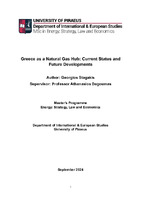| dc.description.abstractEN | In recent years, the European natural gas sector has undergone significant transformation, with notable shifts in trading and pricing mechanisms. Historically, oil indexation dominated gas pricing, but there has been a marked transition towards hub-based pricing models. Gas hubs, whether virtual or physical, have grown in prominence, serving as key marketplaces that enhance transparency and pricing efficiency by facilitating the exchange of gas volumes between buyers and sellers.
Despite these advancements across much of Europe, Southeast Europe continues to face challenges in establishing an efficient market mechanism for gas trading and price discovery. The region's gas exchange is still largely dependent on bilateral agreements, which impedes the development of a more competitive and dynamic market environment. The absence of a robust price discovery mechanism for spot prices further limits market evolution.
Energy security remains a critical concern for the European Union (EU), which is actively working to decrease reliance on external suppliers and promote stable, open, and liquid energy markets. One of the EU's key objectives is the creation of a mature regional natural gas hub in Southeastern Europe. Such a hub would not only support wholesale trading but also provide a platform for both physical and financial transactions, thereby enhancing market competitiveness. However, to realize this goal, initial administrative oversight may be necessary to ensure the hub's effective operation and development.
This thesis aims to assess the potential of the existing Greek gas hub, the Hellenic Trading Point, to evolve into a fully mature regional hub. The study will consider recent developments in the Southeast European gas market, as well as the broader trend towards establishing additional hubs across Europe. The methodology will involve an analysis of the dynamics and characteristics of established European gas hubs, followed by an exploration of the unique features of the Southeast European market. Finally, the study will identify strategies to attract higher volumes and increased participation from market players, ultimately supporting the hub's growth and maturity. | el |



